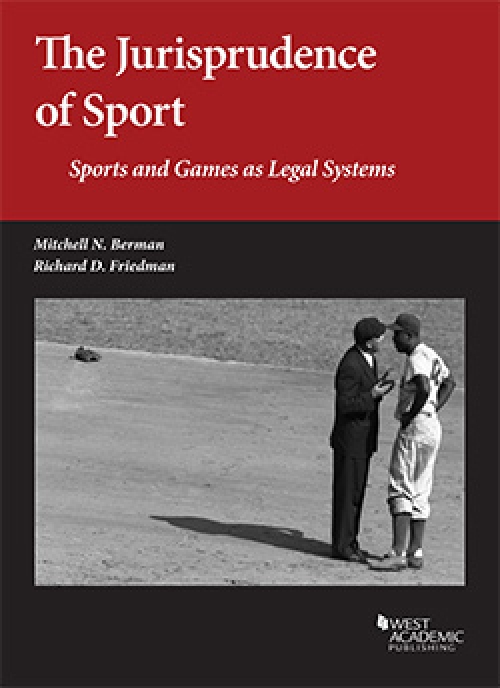Richard Friedman, the Alene and Allan F. Smith Professor of Law, has been instrumental in developing the concept of sports as legal systems—an idea that he has been teaching for more than a dozen years. Friedman and former student Mitchell Berman have collaborated on a related textbook, The Jurisprudence of Sport: Sports and Games as Legal Systems. It covers questions like the pros and cons of mercy rules, different types of penalties and sanctions, eligibility requirements, issues of performance enhancement, and errors in officiating.
As basketball and hockey seasons wind down and Major League Baseball winds up, Friedman answers five questions about the book and some of the issues it raises:
1. What do we gain from thinking about sports as legal systems? How does this help our understanding of the law?

The idea is to give students exercise in thinking about the rules that govern a human activity. I tend to take the view that anything that gets students intellectually engaged in thinking about how the law governing an activity works is good pedagogically, and there’s no doubt that this gets students intellectually engaged. I actually feel I can do my best pure law teaching in this course, because there’s no concern about anything other than, “Is this an issue worth discussing?”
There are a lot of jurisprudential lessons, but I tend to let them emerge. For example, one thing we talk about is formal versus informal rules. These are standard legal questions that any legal regimen has to deal with, and they’re prolific in sports.
2. Has the rise of instant replay, and other technological advances in officiating, increased confidence in the outcomes of games?
The world existed for a long time without instant replay in sports. They did fine, though there are some notable examples of blown calls that are long remembered as blown calls. That’s a shame, but we lived. There are fewer calls that are outrageously bad because of replay, but there still are some, in part because of limitations of the system. It’s imperfect.
It’s become inevitable that we have replay review, so we’ve just got to corral it. It raises a lot of issues, such as the scope of it, what’s the proper standard review, who decides, et cetera. You can manage those issues. I don’t know that it’s worth it, but I don’t think it’s going away.
3. We saw a large number of upsets in this year’s NCAA basketball tournaments. What if anything does this tell us about the effectiveness of “seeding” systems?
It is remarkable that not one of the top 12 men’s teams made it to the Final Four. With the enormous amount of data available, it’s not for lack of information that the seedings got it so wrong. It could just be that talent is spread much more broadly than we anticipated, which may not continue to be so in an NIL world. Upsets are possible, but we’re not that far removed from 2008, when the four top seeds made it, so I’d want more data to know whether there’s anything really significant going on.
4. What do you make of the coming expansion to the college football playoff system? Will that help make sure the best teams reach the playoff, or that the best one wins?
Frankly, I don’t like it. We went from no playoff to two teams to four, and now 12. Now the playoff will be 11 games over four weeks. That’s on top of a 12-game regular season and the conference championship game. So conceivably, one team could play 17 games. That’s an awful lot. As long as we have the ideal that the players are student-athletes—and I do think that means something—I think that’s very hard.
Another factor is the idea of how we know who the best team is. If you have 12 teams, it’s hard for a team that’s left out to say, “Oh, we had a really strong chance of winning.” Yet I don’t think that championship tournaments even in the best of circumstances necessarily determine who’s the best team. Last year, Georgia barely got by Ohio State, who almost got left out. Was Georgia the best? All we can really say is they won. The 1960 Yankees were a far better team than the Pirates, whom they clobbered in three games. But the Pirates won four close ones. There are lots of championships where we can’t say the better team won. We hear this idea that “you’ve got to determine who’s the best!” No, you don’t.
5. What’s the single biggest takeaway that you hope students will walk away with from this course or this book?
I encourage them to think big and to think about substantial changes. In the realm of sports, big changes occur. Basketball added a three-point shot. In baseball, the designated hitter is a big change, and there are some pretty substantial rule changes this year. So I encourage students to not treat what is as dispositive. You realize that in sports, as in the law more generally, as in life, sometimes there are substantial changes. In thinking about a change, you’ve got to think, “This upsets some expectations; it alters the way we do things; but in broad-based terms, is this a good thing?” That’s the most important lesson I hope students will walk away with.







